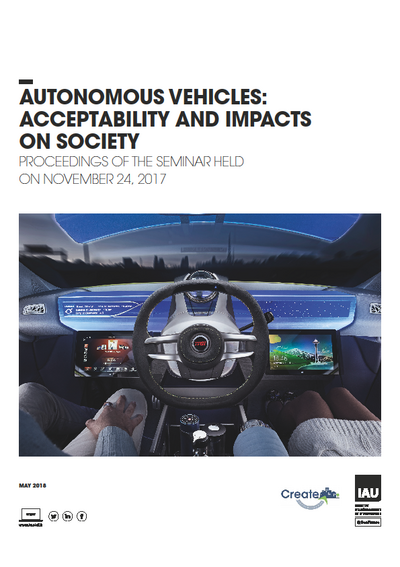Autonomous Vehicles
The idea of automated driving is not new, it dates back to the 1930s. Autonomous vehicles are held to be the next shift in the automotive and mobility fields. These vehicles are likely to have a broad spectrum of impacts on our society. Yet, public authorities haven’t really integrated this disruptive technology in their agenda.
In order to help them and the wider public to anticipate the introduction of automated vehicles and also the arrival of new actors, L'Institut Paris Region gathered experts from different fields on the 24th of November 2017 at the headquarters of L'Institut Paris Region to have a better understanding of that rising and global thematic. The document available opposite is a downloadable version of the proceedings of this seminar and it reflects the rich presentations and exchanges which took place all morning.
Moderators and speakers:
Tom Cohen, UCL, UK, moderator
Tom is Senior Fellow (Research & Teaching) at UCL’s Centre for Transport Studies in London. Since September 2016, he has led a work package centred on future developments within CREATE, a research project funded by Horizon 2020. Prior to this, he led a consultancy project carried out by UCL for the UK’s Department for Transport on the social and behavioural questions relating to automated vehicles.
Download the PDF file of the presentation given by Tom Cohen
Charlotte Halpern, SciencesPo, Paris, moderator
Charlotte Halpern holds a PhD in political science and is an associate research professor at the Centre for European Studies and Comparative Politics (SciencesPo) in Paris. She has done extensive research on various infrastructure (airport and light rail) and environmental policies (waste, urban utilities) in European member states and the EU. She is currently working on a single authored book on comparative airport policies in Europe, and co-edits a forthcoming special issue of Comparative European Politics on new modes of governance in Europe.
Download the PDF file of the presentation given by Charlotte Halpern
Paul Beauvallet (Regional Council of Ile-de-France)
Director of the Transport Pole at the Regional Council of Ile-de-France.
Emmanuel Ravalet, LaSUR research laboratory, EPFL, Switzerland
Emmanuel is an engineer, doctor in Economics and PhD in Urban Studies. He currently works at the Institute of Geography and Sustainability of the University of Lausanne and for Mobil'Homme, a research and studies firm, of which he is a founding partner. His research focuses on work-related mobility, energy consumption, innovative modes of transport and new mobility services.
Download the PDF file of the presentation given by Emmanuel Ravalet
Jaâfar is a PhD student at VEDECOM. His current thesis entitled Techno-economic assessment of the new mobility services based on the use of the autonomous vehicles aims at defining, designing and testing automated vehicle systems running in urban areas, their main functions (in terms of service quality, ratio quality-price and impact on urban territory) and their technical characteristics which allow them to achieve these functions.
Download the PDF file of the presentation given by Jaafar Berrada
Panelists:
Clémence is a political scientist and historian by background. She specializes in environmental and transport policies and in developing transformative governance for cities, in particular linked with urban mobility. She is based at the Civil, Environmental and Geomatic engineering department, UCL and is involved in various cross-departmental collaborations.
Florent graduated in general engineering from ICAM (Lille) in 2014. He has a master degree in “innovation management” from the University Paris Dauphine. After a position as project management officer at Reydel Automotive, he moved to Beijing where he worked at the Embassy of France in the department of Science and Technology. He joined Mov’eo in 2017 as European projects manager, in charge of two H2020-funded projects related to autonomous and connected vehicles.
Sina did her master thesis on user acceptance of Google's self-driving car at the Society and Technology Research Group of the Daimler AG in Berlin, where she worked as working student from June 2013 to August 2014 during her double master degree Innovation Management and Entrepreneurship and Business Administration at the Technical University Berlin and the University of Enschede in the Netherlands. She is currently doing her PhD at the Delft University of Technology in joint cooperation with the InnoZ on user acceptance of automated public transport systems. At the InnoZ in Berlin, she is leading the user acceptance research involving an automated shuttle from the U.S. based start-up Local Motors. From June 2017, she has been working at the WZB on a project that is focused on the potential of big data for the mobility sector.
William Payre, Coventry University, UK
William is a researcher in psychology and ergonomics at the University of Coventry. He is currently working for the Connected Intelligent Transport Environment (UK CITE) project. His areas of research are human-machine interactions, automated and connected vehicles, and the acceptability of new technologies by the general public.
This study is linked to the following theme :
Mobility
